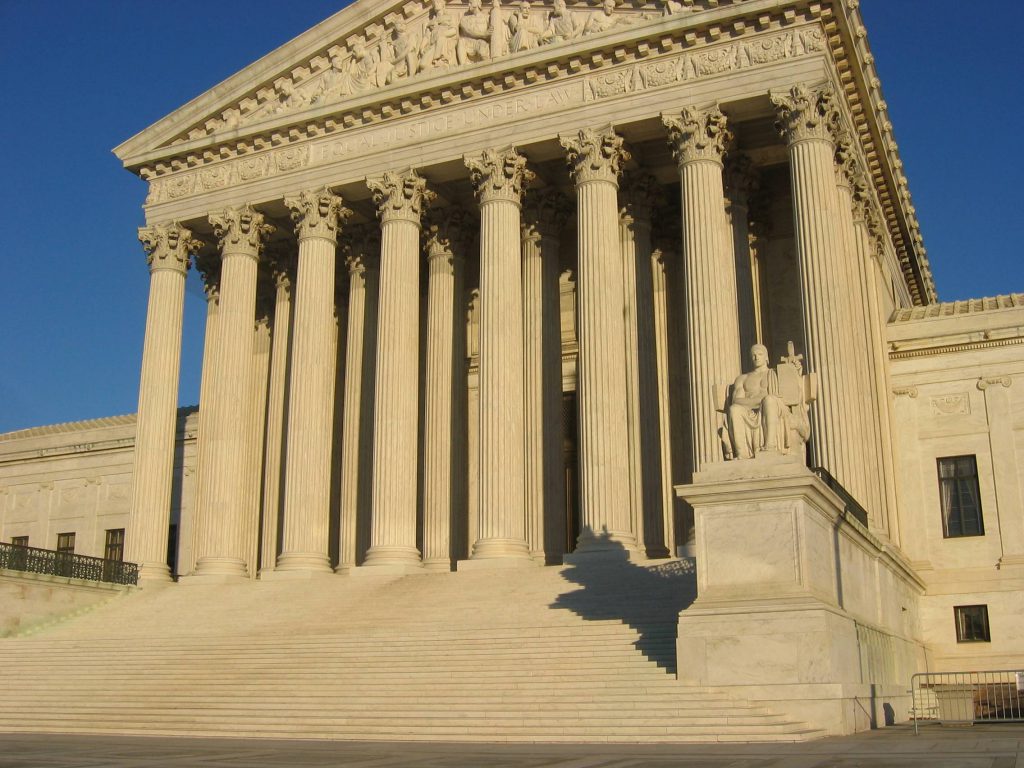No one would ever really expect that the arrest of a man could change an entire nation’s legal system. This was a man who came from a rough background, apprehended several times for petty crimes. He had been unable to hold a job even with nothing more than an eighth-grade education. He spent his life drifting from city to city, either searching for a job, at times getting arrested, never really having a permanent place to call home.1 On the fateful day of this latest arrest, he was charged with breaking and entering into a pool house in Panama City, Florida.2 This final arrest for Clarence Earl Gideon would spark one of the most well known and famous cases in the United States, Gideon v. Wainwright.3

August 4, 1961, the day of his first trial, Gideon was left to represent himself in court because his request for an attorney had been denied.4 He did not have the money to pay for an attorney, leaving him with the only option: to defend himself. The odds were stacked against him, he had so little formal education, and almost no knowledge of the law, he poorly represented himself.5 As briefly mentioned, he was accused of breaking and entering into a pool house. Gideon had allegedly stolen $5 in change and a few bottles of beer and soda, and $50 from the jukebox.6 To make matters worse, the sole witness to the events, a man named, Henry Cook, gave a damaging testimony under oath that he saw Gideon in the pool room at the time of the crime. Cook explained that he witnessed Gideon walk out several minutes later with a pint of wine and a pocket full of change.7 Gideon was ultimately found guilty of the charges brought against him. Although, he had requested legal representation, the state of Florida denied him this right to an attorney, claiming that only defendants who had been charged with a capital offense, had that right. Gideon was sentenced to the maximum term: five years in jail.8 Shortly after being sentenced, Gideon began to study the law while in the prison and began learning about his rights from all the books in the library. Gideon realized that his 6th and 14th Amendment rights had been violated. The 6th Amendment “guarantees the rights of criminal defendants, including the right to a public trial without unnecessary delay, the right to an attorney, the right to an impartial jury, and the right to know who your accusers are, and the nature of the charges and evidence against you.”9

This eventually led him to file a writ of habeas corpus petition to the Florida Supreme Court. By legal definition, a writ of habeas corpus petition is used “to bring a prisoner or detainee before the court to determine if the person’s imprisonment or detention is lawful.”10 Interestingly enough the writ of habeas corpus first originated back to the year 1215 through the 39th clause of the Magna Carta signed by King John who stated: “No free man is to be arrested, or imprisoned, or disseised, or outlawed, or exiled, or in any other way ruined, nor will we go against him or send against him, except by the lawful judgment of his peers or by the law of the land.”11 This clause had influenced the framing of the U.S. Constitution, more specifically the 14th Amendment, which states, “… No state shall make or enforce any law which shall abridge the privileges or immunities of citizens of the United States; nor shall any state deprive any person of life, liberty, or property, without due process of law; nor deny to any person within its jurisdiction the equal protection of the laws.”12 This amendment ties closely in with the Universal Declaration of Human Rights under Article III which guarantees non-discrimination, Article III which protects life, liberty, and security, and Articles VI and VII which promotes equal protection.13 This ultimately tied into Gideon’s petition, as recorded by the U.S. Department of Justice Archives, “Gideon challenged his conviction and sentence on the ground that the trial judge’s refusal to appoint counsel violated Gideon’s constitutional rights.”14 Unfortunately for Gideon, his Habeus Corpus petition was denied. Despite this new denial, Gideon refused to give up. He then proceeded to seek help from the highest court in the United States.
Frustrated and determined, Gideon did the unexpected. Gideon filed a handwritten petition for a writ of certiorari to the nine Justices of the Supreme Court of the United States. By legal definition, a writ of certiorari is, “A request that the Supreme Court order a lower court to send up the record of the case for review.15 Again, Gideon argued in his petition that his legal right to representation guaranteed by the U.S. Constitution had been violated. From his prison cell, Gideon wrote, “It makes no difference how old I am or what color I am or what church I belong too if any. The question is I did not get a fair trial. The question is very simple. I requested the court to appoint me attorney and the court refused. All countrys try to give there Citizens a fair trial and see to it that they have counsel.” 16 Gideon’s words and calls for help were recognized by the Supreme Court Justices. They agreed to hear his case. However, in doing so the Supreme Court would potentially be overturning the precedent ruling from another court case, Betts v. Brady (1942), which “denied counsel to indigent defendants when prosecuted by a state.17

January 15, 1963, Gideon came before the Supreme Court, this time with the help of a team of court-appointed lawyers led by Attorney Abe Fortas, who would later become an Associate Supreme Court Justice. During the trial, Fortas held the strong argument that “the aid of counsel is indispensable to a fair hearing.”18 Arguing for the Respondent at the time of the trial was Bruce Robert Jacob. Jacob represented the state of Florida, argued on the grounds of the Betts decision stated, “that every state should have the right to decide when and under what circumstances lawyers should be appointed.” Directly appealing to the state’s rights, he claimed, “that the cost of providing counsel to all defendants would be a “tremendous burden on the taxpayers.”19 Ultimately the decision came down to the nine Justices. On March 18, 1963, in a unanimous decision, the Supreme Court ruled in favor of Gideon.20 The court’s decision was founded on the notion that “The Sixth Amendment’s guarantee of counsel is a fundamental right essential to a fair trial and, as such, applies the states through the Due Process Clause of the Fourteenth Amendment.” 21 In the court opinion, Justice Hugo Black wrote: “reason and reflection require us to recognize that in our adversary system of criminal justice, any person hauled into court, who is too poor to hire a lawyer, cannot be assured a fair trial unless counsel is provided for him.”22 This statement strengthened and supported the court’s ruling to side with Gideon and overturn a 20-year old decision. As a result of the ruling, this decision now set a new precedent for the supreme law of the land. Meaning, that all states and all levels of criminal legal proceedings and courts are required, by federal law, to provide counsel to those who cannot afford to pay for their own representation. 23.

As a result of all the legal proceedings and the decision that he had a right to a court appointed attorney, Gideon was not acquitted, but was granted a retrial with proper representation. The retrial led to the acquittal of Gideon. 24 Gideon went off to live the rest of his life as a free man until his death from cancer on January 18, 1972, in Ft. Lauderdale, Florida.25 Thanks to Gideon’s perseverance today we all have a right to a court appointed attorney.
- Kimberly Harper, “Clarence Earl Gideon,” The State Historical Society of Missouri, (2004). ↵
- Kimberly Harper, “Clarence Earl Gideon,” The State Historical Society of Missouri, (2004). ↵
- Administrative Office of U.S. Courts, “Facts and Case Summary: Gideon v. Wainwright 372 U.S. 335 (1963),” Federal Judiciary. ↵
- Josh Ashenmiller, “Gideon v. Wainwright” Encyclopedia Britannica, Encyclopedia Britannica, Inc. (2019). ↵
- Kimberly Harper, “Clarence Earl Gideon,” The State Historical Society of Missouri, (2004). ↵
- Jerold Israel, “Gideon v. Wainwright: The Art of Overruling,” University of Michigan Law School, (1963). ↵
- Jason Robin, “Clarence Earl Gideon,” University of Michigan Law School, 1989. ↵
- Jason Robin, “Clarence Earl Gideon,” University of Michigan Law School, 1989. ↵
- United States Constitution, “The Bill of Rights: sixth amendment.” ↵
- Legal Information Institute, “Habeas Corpus,” Cornell Law School, (1992). ↵
- King John of England, “Magna Carta,” (1215). ↵
- United States Constitution, “The Bill of Rights: Fourteenth Amendment.” ↵
- The United Nations, “Universal Declaration of Human Rights,” (1948). ↵
- U.S. Department of Justice Archives, “Gideon v. Wainwright,” (2018). ↵
- Legal Information Institute, “Writ of Certiorari,” Cornell Law School, (1992). ↵
- Clarence E. Gideon, “In the Supreme Court of the United States October Term, 1961 No. 890 Misc. Clarence Earl Gideon, Petitioner vs. H.G. Cochran, Jr., Director, Division of Corrections, Page 1, (1962). ↵
- “Betts v. Brady.” Oyez. Accessed February 20, 2020. https://www.oyez.org/cases. (1942). ↵
- Jason Robin, “Clarence Earl Gideon,” University of Michigan Law School, (1989). ↵
- Jason Robin, “Clarence Earl Gideon,” University of Michigan Law School, (1989). ↵
- “Gideon v. Wainwright.” Oyez. Accessed February 20, 2020. https://www.oyez.org/cases. ↵
- Administrative Office of U.S. Courts, “Facts and Case Summary: Gideon v. Wainwright 372 U.S. 335 (1963),” Federal Judiciary. ↵
- “Landmark Cases of the U.S. Supreme Court, “Gideon v. Wainwright: Key Excerpts From The Majority Opinion,” https://www.landmarkcases.org/gideon-v-wainwright. ↵
- Jerold Israel, “Gideon v. Wainwright: The Art of Overruling,” University of Michigan Law School, (1963). ↵
- Josh Ashenmiller, “Gideon v. Wainwright” Encyclopedia Britannica, Encyclopedia Britannica, Inc. (2019). ↵
- Kimberly Harper, “Clarence Earl Gideon,” The State Historical Society of Missouri, (2004). ↵



39 comments
Thiffany Yeupell
Gideon truly took matters into his own hands, to get a fair trial and receive the legal representation that he is guaranteed by the Bill of Rights as a US citizen. To educate himself and push for a look at his case, with the filing of the writ of habeas corpus, is stubborn but exemplary. But it does astound me that the Florida court had a basis in their actions and decision, given the ruling in the Betts v. Brady case, which would ultimately be overturned as the rights of the citizen would be interpreted to the requirement of the right to an attorney for every citizen when facing trial.
Hali Garcia
This is a very informative article! I really enjoy reading about the Supreme Court cases that created a precedent for our rights. I heard about this case in my Constitutional Law class when I was a freshman and it is very interesting. Gideon’s rights were violated and he did not get a fair trial. I like how he learned about law while he was in jail and challenged the system.
Kendall Guajardo
Really great article! Even from his time in prison he used it as a learning lesson. This fundamental court case was a step towards cementing the constitution but at the same time we are still leaps away from a completely fair trial. So many variables make up the legal system it is definitely hard to be completely neutral when representing people, because of the quality of lawyers. There is different biases that make up the court system which are not entirely visible. This man went through a great deal of effort to give us our constitutional right and that makes for a pretty amazing story.
Destiny Lucero
It was unethical for these people dealing with the law as their career to take advantage of an ignorant man. This poor man didn’t know any better during the trial and that was unfair for the judge to deny any one to represent him. It was good of him to listen to his instinct after the fact and go into prison and better himself. He had access to books which granted him knowledge and enough facts to back himself up to fight against his original case. Good read and well written.
Lulu Avitua-Uviedo
Great article. I studied this case when I was taking paralegal classes and again in Con-Law. Cases such as this one which become precedence cases are great. They provide facts and bases for future cases. When one begins to understand the importance of knowing the Amendments, they will see how they are a guideline for cases that are to be presented. This case proved that though the courts failed to allow presentation, one can research and discover how the law works and how to represent themselves. We may not always agree with the final judgement but we can always appeal.
Davis Nickle
This right to an attorney is something I have always taken for granted You never really think of the importance of it until you are denied the right. I would never be able to properly defend myself in court, I would be completely hopeless. Hopeless is probably how Gideon felt and I am very glad he took this up and challenged the injustice that he suffered from. He improved our legal system as a whole through his actions
Luis Jaen
I have always heard of the trial that cemented the ability for an attorney, Gideon v Wainwright, but I have never heard the story behind what happened. Although Gideon was not innocent, with his determination and grit he was able to win the trial and change part of the law that was in place. I did not know that this all started with a breaking and entering charge, that is crazy. Overall this article was very detailed and explained what happened very well. Gideon fought for a court appointed attorney and gave hope to many people who would not be able to afford an attorney.
Sofia Almanzan
Great Article. I love supreme court cases being a political science major because they set precedent for the country. I remember hearing about this case for my AP government class but I didn’t remember the detail so this article was enlightening.
Andrea Degollado
Honestly I had never out much thought into this matter, for some reason I always assumed that the right to have an attorney had always been around. I found this article extremely interesting. I think its interesting to read how Gideon didn’t give up when the system failed him and how a “petty thief” was able to highlight and issue in our system. This article was very informative and very well written.
Nelly Perez
I thought Gideon would be given access to an attorney by the police department if he could not afford a lawyer, but he ended up defending himself. He tried his best at defending himself, but it landed him five years in jail. He created a petition while studying the law because he learned that his rights were violated. After denial of his petition, he kept fighting.